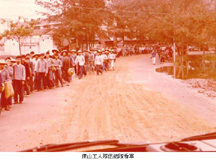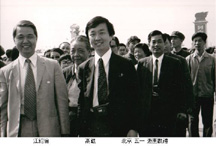Kong Shiu Loon 江紹倫
China Meets the World (1), A Thirty-Year Story, 1979 ~ 2009
Ours is a time of change, like any other time. What is different is both the content and speed of change are so immensely vast and fast that we are caught in surprise. A glimpse of how it all began would help us understand the present and the future in clearer perspective.
 President Nixon visited China in the spring of 1972. Two weeks later, I led a group of professors, including the now installed Nobel Laureate Dr. Charles K. Kao (高錕), and their families from overseas in an education tour to visit Guangzhou, Xian, Beijing, Shanghai and Hangzhou. Every time our bus stopped, people looked at us like we were animals in the zoo. They were curious and reflective, not knowing why overseas fellow Chinese could be so different from them.
President Nixon visited China in the spring of 1972. Two weeks later, I led a group of professors, including the now installed Nobel Laureate Dr. Charles K. Kao (高錕), and their families from overseas in an education tour to visit Guangzhou, Xian, Beijing, Shanghai and Hangzhou. Every time our bus stopped, people looked at us like we were animals in the zoo. They were curious and reflective, not knowing why overseas fellow Chinese could be so different from them.
Fate brought me to Hong Kong again in 1979. There, Mr. Yuen Gang (袁庚), took me to Shekou, across from Hong Kong’s New Territories. Yuen was to be the architect of China’s first Special Economic Zone at Shekou, a 3-square-mile area with a small fishing village. A legendary figure, he represented the Communist to witness the surrender of the Japanese in 1945, handing back Hong Kong to the British Government. He was 28 years old then. Now approaching 60, he would begin a totally new career, one that would change China and the world.
Our boat docked at a make-shift dock. We walked through a 15-yard one-plank bridge to land at the top of the beech, and then went straight up to the top of Nam Shen (南山) overlooking the bay. The sea was calm, covered by oyster-mats and bamboo platforms which supported nets to nurture oysters.
“Five, ten years from now, this will be a booming industrial town of 10,000 people serving 150 factories and enterprises. May be more.” Yuen told me, much like muttering to himself.
“Where would these people be from?” I asked.
“From recruitment all over China, mostly university grads.”
“How would they adjust to a world of multiple possibilities when they were trained to believe that everything was measured by a bilateral scale of rights and wrongs?”
“That’s why you are here today. We need your help.” Yuen was sure as a button.
Three months later, I stood before a class of 64 people, young adults who had survived intense changes in life. They were the first batch of university students admitted to the newly opened universities of science and technology which were practically closed for 15 years during the Cultural Revolution. And now they were to be educated to become administrators and managers of foreign companies setting up shop in China.
There were moments of discomfort as they faced me, a psychology professor from the University of Toronto. Western psychology had been banned in China for 25 years because it was non-materialistic, the wrong side of the right ideology.
I did not have a single note with me because I, too, was searching for words to begin my lecture. Fortunately, I saw staring eyes from among the students who sat at the front rows. I knew, regardless how things went, they would be pivotal in how successful China would meet the world. I talked about how human beings have varying needs, and how we were driven by them to cope with and change our world – a world shaped by individuals, and not an absolute authority.
Some students stirred, chattering with one another. In the end, the three-hour lecture was quietly interrupted many times. But, there was no open challenge. Everyone knew that change was imminent, however difficult. And I was to lecture them again.
On my recent visit to Shekou last year, I had dinner with two of those students I taught some 30 years ago. Both are now in commanding positions.
“What you said changed me in a way that I could not dream of, professor.” said my host who was one of the only five female students in that lecture.
I looked at her, now confident and affable, overseeing much of the Industrial Zone, a new name for Shekou. I did not remember what I had specifically said so long ago.
She continued, in a tone more like reminiscing than communicating with me, “You said, professor, that if an authority kept the needs of the people to a minimum and convinced them that tomorrow would be better, then the people would be willing to submit totally to what the authority wanted them to do, or to be. You did not tell us if that was true or untrue. But we wanted a straight answer. I was 26 years old then, and I had heard nothing like that in my life. After days of pondering, I decided that I could choose to do things that I felt was right. I became an independent person.”
I asked her about her family and what was new so we could have a nice dinner together, rather than getting into the sensitive issue of who did what to change China.
History needs heroes for drama. However as Han Suyin said at the beginning of her novel, The Morning Deluge, "A revolution is like a tide, it generates a lot of froth some of which glitter in colourful brilliance in the morning sun. In the end, the common people are the water. And new froth shines, carried by incessant tides."
Today, as we celebrate the successes of 30 years of “Opening Up”, much could be learned from our very humble beginning. That beginning had its focus not on how much and how fast money could be made. Rather it was on education, how the human mind could be kindled like flames to give meaning to life and progress.
This is only a vignette of a big story, one only a well-minded people could write well.



